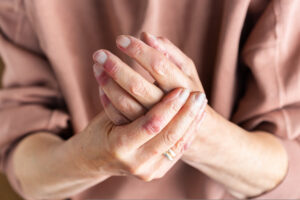Published On: Apr 5, 2021
Last Updated On: Mar 12, 2024
Spending time in the garden is a great source of joy, but it can also be tricky for people living with eczema. Pollens, hot sun, scratchy garden gloves and harsh chemicals can cause skin to flare. The good news is that it’s absolutely possible to garden safely without setting off your skin.
“There is something so healing in witnessing new green life sprout out of the soil after a long winter,” said Dr. Laura McGevna, a board certified dermatologist at Swae Skin Dermatology in South Burlington, Vermont. “Gardens are both tenuous and resilient — you could draw a lot of comparisons here, including to our skin. We just have to have a plan to keep our eczema under control.”
If you’re itching to get back in the garden this spring, grab your shovels, assemble your seeds and starts and follow Dr. McGevna’s top five tips for keeping your skin happy while working outside.
1. Choose gloves that don’t irritate your skin.
“Gardening gloves can sometimes work against you,” Dr. McGevna said. She suggests using gloves that are made from natural materials, like thick cotton, and avoiding gloves made from rubber or plastic.
“Also reach for gloves that don’t have a lot of screen printed designs,” Dr. McGevna added. “Those can contain agents that are irritating to skin like formaldehyde, which helps colors stay fixed. If you happen to be using a pesticide or herbicide, both of which can be dangerous, try nitrile gloves with natural fabric liners to prevent irritation.”
Sweating inside gardening gloves, Dr. McGevna noted, can also aggravate eczema. She suggests removing your gloves intermittently to give your hands some fresh air.
“Take breaks from your gloves. Rinse your hands when you come inside. Immediately apply moisturizer and sit back and watch your garden grow.”
2. Wear layers you can remove if you get too hot.
Covering up your skin, Dr. McGevna explained, is helpful for avoiding contact with irritants in plant oils or compounds. It can also help prevent infection while you’re digging in the dirt.
“If you’re doing a task that requires some muscle, like heavy raking or digging or carrying a load, be sure to cover any areas of skin that are actively inflamed and might therefore be at risk for breakdown,” Dr. McGevna said. “If your hands are sore and the skin is flaring, it’s probably best to leave the heavy digging for another day.”
Of course, wearing layers can make you sweaty, which exacerbates itch. Dr. McGevna said to do what feels best: “My best advice is to dress in natural soft layers and be prepared to add or subtract.”
3. Get sun — but not too much sun.
Limited sun exposure can be good for people with eczema. However, overdoing it can result in a painful sunburn and increase your risk of skin cancer. The trick, Dr. McGevna said, is to be thoughtful about it.
“UV exposure may benefit people who live with eczema. This is one of the few times dermatologists endorse baring some skin — but don’t burn!” she cautioned. “Be careful if you’re intending to use sunlight to treat your eczema. Skin can get more accustomed to UV, and over the years your skin might vary in its responsiveness to the UV, depending on several factors.”
Dr. McGevna recommends checking the UV index for that day when checking the weather conditions for that day, limiting your time in direct sunlight and avoiding sun exposure in the middle of the day when the sun is at its strongest.
4. Avoid harsh irritants and rinse off when your gardening session is done.
Gardening safely with eczema means “know[ing] your enemies and your allies,” Dr. McGevna said. “Some notable enemies are fertilizers and pesticides that are irritating to skin, and harsh foaming soaps for washing off soil.” Handle pesticides with care, and opt for gentle, unscented soaps.
Water is an ally, and Dr. McGevna recommends a quick rinse once your time in the garden has ended for the day. “After working in the garden, short baths or showers with tepid water are a good idea.”
5. Enjoy your time in the garden — and its many benefits.
There’s more to reap from gardening than just whatever you’re growing. There are other health benefits, too, such as relaxation, fresh air and a natural source of fresh produce.
“To be among beautiful rich soils, new flowers, plants and foods that we grow ourselves can be meditative,” Dr. McGevna said. “Growing our own food helps diversify and enrich our diets, which may also be helpful both for the microbes in the soil and in our gastrointestinal tract.”Your skin doesn’t have to stop you from enjoying those benefits, especially if you garden with care — so don’t be afraid to dig in this season.






